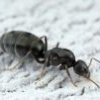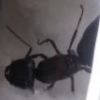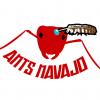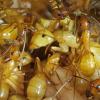- Formiculture.com
- Forums
- Gallery
- Members
- Member Map
- Chat

AC Slowing down ant growth?
Started By
Pumpkin_Loves_Ants
, Jul 17 2019 7:14 AM
19 replies to this topic
#1
 Offline
-
Posted July 17 2019 - 7:14 AM
Offline
-
Posted July 17 2019 - 7:14 AM
Hello! I usually keep the air conditioning in my house at around 73F°. Could this be slowing down the progression of my ant colonies and queens tending to her first eggs? If so should I place a heating mat or cord near her or wrap her in some insulating tubing to retain some heat? The queen that I am worried about is a Tetramorium Immigran with around 9 or so eggs.
Lasius Neoniger (Around 23ish workers)
Tetramorium Immigran (8 Workers)
Myrmica Queen (Not 100% on species)
Formica Subsericea (No workers)
#2
 Offline
-
Posted July 17 2019 - 7:15 AM
Offline
-
Posted July 17 2019 - 7:15 AM
I placed my brand new colony on a heating pad yesterday and they already have about 5 new workers already. Everybody else is probably going to tell you that heating is best for egg production and other stuff I forgot.
My Journal featuring all of what I'm keeping
Keeper of:
x2 Camponotus Novaeboracensis Queen(s)
x2 Camponotus Pennsylvanicus Queen(s)
x1 Tetramorium Immigrans Queen(s)
x1 Tetramorium Immigrans Colony
x1 Tapinoma Sessile Colony
#3
 Offline
-
Posted July 17 2019 - 8:07 AM
Offline
-
Posted July 17 2019 - 8:07 AM
#4
 Offline
-
Posted July 17 2019 - 10:11 AM
Offline
-
Posted July 17 2019 - 10:11 AM
I'm keeping Camponotus and Tapinoma colonies in an A/C run room and it does seem to slow the growth of my colonies. I have a heating cable wrapped around my ant shelf that I turn on when I want to warm them up, usually when I get up in the morning and unplug it before I go to bed or when the temp in the nest becomes too warm. It's plugged into a timer that turns it on and off every 15 mins while it's plugged in, I have a thermometer in the nest that I monitor to make sure the temperature doesn't climb too high which I unplug when it gets around 86-87 degrees F. One time I found the brood piled in their vinyl tubing because I think it was too warm in their nest, it was about 87 degrees F, so I quickly unplugged it. I work in the same room as my colony though, so I'm able to monitor them constantly and this set up works for me. I think I'd do a thermostat with a heating element if you're having to leave them alone with heat.
My Youtube channel: Ants Navajo Keeping- Camponotus pennsylvanicus, Tapinoma sessile x 2, Pheidole sp x 2
"We may be witnesses to a Biblical prophecy come true - 'And there shall be destruction and darkness come upon creation and the beasts shall reign over the earth.'" - Dr. Harold Medford
#5
 Offline
-
Posted July 17 2019 - 10:40 AM
Offline
-
Posted July 17 2019 - 10:40 AM
Ok I found a box and put a couple queens inside then put the box in my garage. The box has padding so they won't be able to roll around. I was also wondering does humidity affect the growth of eggs and larvae? Thanks!
Edited by Pumpkin_Loves_Ants, July 17 2019 - 10:42 AM.
Lasius Neoniger (Around 23ish workers)
Tetramorium Immigran (8 Workers)
Myrmica Queen (Not 100% on species)
Formica Subsericea (No workers)
#6
 Offline
-
Posted July 17 2019 - 12:14 PM
Offline
-
Posted July 17 2019 - 12:14 PM
The eggs and larvae need high humidity to survive and thrive, that's why the test tube setup is great for founding a colony. The queen has an area of high humidity next to the moistened cotton or can place further away according to needs. As far as humidity in the out world when the colony has a need for one, as long as you don't make it a more preferable nesting spot it shouldn't be a problem. I like to keep my out world dry but do spray a few little mists of water when I throw in some food. Depending on certain species though, some ants need high humidity but it depends on where you caught your queen and her wild habitat preferences.
Edited by Boog, July 17 2019 - 12:15 PM.
- dermy likes this
My Youtube channel: Ants Navajo Keeping- Camponotus pennsylvanicus, Tapinoma sessile x 2, Pheidole sp x 2
"We may be witnesses to a Biblical prophecy come true - 'And there shall be destruction and darkness come upon creation and the beasts shall reign over the earth.'" - Dr. Harold Medford
#7
 Offline
-
Posted July 17 2019 - 2:33 PM
Offline
-
Posted July 17 2019 - 2:33 PM
Yes, 73 F (23 C) will slow development of some ants, but the effect will vary by species. Growth of ant species having natural ranges further north won't be as inhibited by cooler temperatures as ants native to the tropics, for example.
byFormica® is the manufacturer of the iconic nectar feeders and Sunburst Ant Nectar.
byFormica ant products always deliver consistent performance, convenience,
and reliability, making them among the most beloved ant foods and kit enjoyed by
ant keeping enthusiasts worldwide. For more information, visit www.byFormica.com.
#8
 Offline
-
Posted July 24 2019 - 2:46 AM
Offline
-
Posted July 24 2019 - 2:46 AM
I am not an ant expert. But I recently got two different Camponotus species. My apartment is always in 72 degrees (22 celsius to my non-american friends) all day. But after I placed a 15w heating cable and one of those temperature regulators from Amazon set to 78 degrees (25 celsius) all day, both queens produced ALOT of new eggs.
#9
 Offline
-
Posted August 4 2019 - 10:08 PM
Offline
-
Posted August 4 2019 - 10:08 PM
22C degrees is the minimum for larvae to pupate and about 17C for eggs to hatch
Current ant colonies -
1) Opisthopsis Rufithorax (strobe ant), Melophorus sp2. black and orange, Pheidole species, Pheidole antipodum
Journal = http://www.formicult...ra-iridomyrmex/
Heterotermes cf brevicatena termite pet/feeder journal = http://www.formicult...feeder-journal/
#10
 Offline
-
Posted August 5 2019 - 8:01 AM
Offline
-
Posted August 5 2019 - 8:01 AM
I live in SoCal where it is hot, about ~84F (29C) indoors on average. My ants are at my desk in a drawer on my left but the AC is on my right which I try to keep the room at around 78. I got one of those cheap plastic Walmart drawers, I drilled a hole to put the power cord through and put a heating pad in there on a timer. The heating pad has no options, just on and off so it stays on around 95F so I stacked a few rags onto it and put a thermometer until it stayed at 85F. The heating pad is on all the time except from 1pm to 8pm where temperatures indoors get hot since it is 90+ (32c+) outside. I would be super hesitant on putting a timer on 15 minute intervals because power surging in and out 15 minutes, if it is like a computer it isn't good for the electronics but that could be totally different since computers have millions of transistors and other parts.
Edited by Silq, August 5 2019 - 8:12 AM.
Ant Journal: http://www.formicult...-journal/<br> My colonies: C. Semitestaceus, P. Californicus, V. Pergandei, S. Xyloni.
#11
 Offline
-
Posted August 5 2019 - 11:02 AM
Offline
-
Posted August 5 2019 - 11:02 AM
Why so much AC if you live in Wisconsin? I live way south of you in The Old Dominion, and we set our AC to 79-80 degrees.
Edited by ANTdrew, August 5 2019 - 11:03 AM.
"The ants are a people not strong, yet they prepare their meat in the summer." Prov. 30:25
Keep ordinary ants in extraordinary ways.
Keep ordinary ants in extraordinary ways.
#12
 Offline
-
Posted August 5 2019 - 11:05 AM
Offline
-
Posted August 5 2019 - 11:05 AM
A heat cable or pad is no replacement for natural heat. There’s a reason everybody takes their winter vacations down south instead of just cranking up their thermostats.
Edited by ANTdrew, August 5 2019 - 11:06 AM.
"The ants are a people not strong, yet they prepare their meat in the summer." Prov. 30:25
Keep ordinary ants in extraordinary ways.
Keep ordinary ants in extraordinary ways.
#13
 Offline
-
Posted August 5 2019 - 11:55 AM
Offline
-
Posted August 5 2019 - 11:55 AM
#14
 Offline
-
Posted August 5 2019 - 11:57 AM
Offline
-
Posted August 5 2019 - 11:57 AM
A heat cable or pad is no replacement for natural heat. There’s a reason everybody takes their winter vacations down south instead of just cranking up their thermostats.
Of course not but people don't want to be stuck indoors when they can go out and enjoy a vacation.
Ant Journal: http://www.formicult...-journal/<br> My colonies: C. Semitestaceus, P. Californicus, V. Pergandei, S. Xyloni.
#15
 Offline
-
Posted August 5 2019 - 12:00 PM
Offline
-
Posted August 5 2019 - 12:00 PM
Why so much AC if you live in Wisconsin? I live way south of you in The Old Dominion, and we set our AC to 79-80 degrees.
Because here in WI if it hits 90 degrees we might die of heat stroke. We aint used to heat. We don't even know what it is.
![]()
![]()
![]()
Billy
Currently keeping:
Camponotus chromaiodes
Camponotus castaneus
Formica subsericea
#16
 Offline
-
Posted August 5 2019 - 12:57 PM
Offline
-
Posted August 5 2019 - 12:57 PM
Alright. Not trying to offend anybody, but I think this is a big reason a lot of people’s colonies don’t thrive. Our world is baking naturally. Why should people have to artificially heat anything really?
"The ants are a people not strong, yet they prepare their meat in the summer." Prov. 30:25
Keep ordinary ants in extraordinary ways.
Keep ordinary ants in extraordinary ways.
#17
 Offline
-
Posted August 5 2019 - 1:15 PM
Offline
-
Posted August 5 2019 - 1:15 PM
Alright. Not trying to offend anybody, but I think this is a big reason a lot of people’s colonies don’t thrive. Our world is baking naturally. Why should people have to artificially heat anything really?
Well.. we are literally taking the ants out of their environment and a 2-3hour drive could mean worlds of differences since that would put them over 200 miles from their habitat. In California, we are taking a lot of them from deserts that get to 100f+ so even if your home is 80f, you could still provide them more heat.
If you think about how refrigerators and ACs work, you could use the heat from the back of the coils to artificially heat your colonies if you are worried about energy conservation but that would be beyond me on how to regulate the temps
- TennesseeAnts and ANTdrew like this
Ant Journal: http://www.formicult...-journal/<br> My colonies: C. Semitestaceus, P. Californicus, V. Pergandei, S. Xyloni.
#18
 Offline
-
Posted August 20 2019 - 12:17 PM
Offline
-
Posted August 20 2019 - 12:17 PM
I would be super hesitant on putting a timer on 15 minute intervals because power surging in and out 15 minutes, if it is like a computer it isn't good for the electronics but that could be totally different since computers have millions of transistors and other parts.
I'm using a Zoo Med Day/Night timer rated for 8 amps/900 watts, which I have a 15 watt Zoo Med heating cable and 3 watt Tetra Whisper 40 air pump plugged into that cycles for heat for the nest and air circulation for the outworld. I wouldn't advise using the heating cable plugged in unattended for long periods, even at the 15 min cycle the heat slowly builds up over time but not too high because of the ventilation of my nest but still uncomfortable for the colony I imagine. I'll be investing in a thermostat once I upgrade my nest so I don't have to keep unplugging the cable but it works for my air-conditioned room for now.
By the way, I don't control the thermostat in the house I live in. I have to deal with a/c so I thought I'd answer this post, I'm sure many of us would like a dedicated room that we could regulate temps for our colonies but unfortunatly we can't.
Edited by Boog, August 20 2019 - 12:19 PM.
My Youtube channel: Ants Navajo Keeping- Camponotus pennsylvanicus, Tapinoma sessile x 2, Pheidole sp x 2
"We may be witnesses to a Biblical prophecy come true - 'And there shall be destruction and darkness come upon creation and the beasts shall reign over the earth.'" - Dr. Harold Medford
#19
 Offline
-
Posted August 20 2019 - 12:22 PM
Offline
-
Posted August 20 2019 - 12:22 PM
I would be super hesitant on putting a timer on 15 minute intervals because power surging in and out 15 minutes, if it is like a computer it isn't good for the electronics but that could be totally different since computers have millions of transistors and other parts.
I'm using a Zoo Med Day/Night timer rated for 8 amps/900 watts, which I have a 15 watt Zoo Med heating cable and 3 watt Tetra Whisper 40 air pump plugged into that cycles for heat for the nest and air circulation for the outworld. I wouldn't advise using the heating cable plugged in unattended for long periods, even at the 15 min cycle the heat slowly builds up over time but not too high because of the ventilation of my nest but still uncomfortable for the colony I imagine. I'll be investing in a thermostat once I upgrade my nest so I don't have to keep unplugging the cable but it works for my air-conditioned room for now.
By the way, I don't control the thermostat in the house I live in. I have to deal with a/c so I thought I'd answer this post, I'm sure many of us would like a dedicated room that we could regulate temps for our colonies but unfortunatly we can't.
I don't know if this thermostat product works for the purpose of regulating heat by reducing/increasing power but that is what I am understanding from the jist of it. I don't know if it would work for this scenario but when I search "reptile heat cable" this pops up. This was designed for heat mats for germinating seeds and this scenario is similar enough in temperature ranges so it might serve the purpose but I would like someone who has experience with this product to chime in.
https://www.amazon.c...=gateway&sr=8-8
Ant Journal: http://www.formicult...-journal/<br> My colonies: C. Semitestaceus, P. Californicus, V. Pergandei, S. Xyloni.
#20
 Offline
-
Posted August 20 2019 - 2:49 PM
Offline
-
Posted August 20 2019 - 2:49 PM
I would be super hesitant on putting a timer on 15 minute intervals because power surging in and out 15 minutes, if it is like a computer it isn't good for the electronics but that could be totally different since computers have millions of transistors and other parts.
I'm using a Zoo Med Day/Night timer rated for 8 amps/900 watts, which I have a 15 watt Zoo Med heating cable and 3 watt Tetra Whisper 40 air pump plugged into that cycles for heat for the nest and air circulation for the outworld. I wouldn't advise using the heating cable plugged in unattended for long periods, even at the 15 min cycle the heat slowly builds up over time but not too high because of the ventilation of my nest but still uncomfortable for the colony I imagine. I'll be investing in a thermostat once I upgrade my nest so I don't have to keep unplugging the cable but it works for my air-conditioned room for now.
By the way, I don't control the thermostat in the house I live in. I have to deal with a/c so I thought I'd answer this post, I'm sure many of us would like a dedicated room that we could regulate temps for our colonies but unfortunatly we can't.
I don't know if this thermostat product works for the purpose of regulating heat by reducing/increasing power but that is what I am understanding from the jist of it. I don't know if it would work for this scenario but when I search "reptile heat cable" this pops up. This was designed for heat mats for germinating seeds and this scenario is similar enough in temperature ranges so it might serve the purpose but I would like someone who has experience with this product to chime in.
https://www.amazon.c...=gateway&sr=8-8
That was one option I had been looking at myself, saw other ones too but am still looking around for now. These are used in reptile setups, so they're okay with heating lamps/mats/cables and should be fine with formicariums as long as your nest is ventilated enough. The thermostat is a switch to power on what ever is plugged into it based on the temperature settings, just be cautious of the power handling capacity of the devices used as stay within the limits. I'm just using a small heating cable, which should be fine, but only works with one sensor in one area, in this case the nest.
My Youtube channel: Ants Navajo Keeping- Camponotus pennsylvanicus, Tapinoma sessile x 2, Pheidole sp x 2
"We may be witnesses to a Biblical prophecy come true - 'And there shall be destruction and darkness come upon creation and the beasts shall reign over the earth.'" - Dr. Harold Medford
0 user(s) are reading this topic
0 members, 0 guests, 0 anonymous users






















